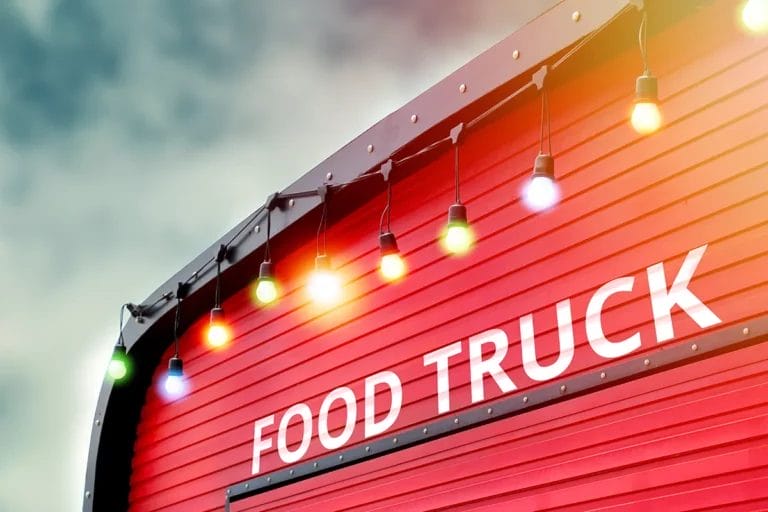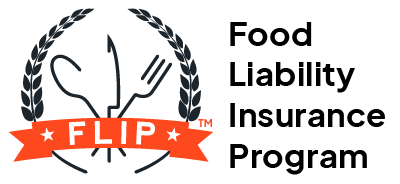Are you ready to join Oklahoma’s thriving food truck scene? Before you hit the road, make sure you have the necessary permits, know the costs, and have comprehensive liability insurance to protect you from third-party claims.
Our guide has the details on all this and more, so get the rundown on how to start a food truck in the Sooner State and set yourself up for success!
Understand Food Truck Requirements in Oklahoma
While starting your business, there are several things you need to sort out before you apply for food truck licenses and permits:
- Business name: Your food truck needs a name creative enough to stand out from the competition, but easy enough for customers to remember and recognize what kind of food or beverage you sell.
- Business classification: This determines how your business is organized and taxed. Sole proprietorships, partnerships, and limited liability companies (LLCs) are popular choices for food truck entrepreneurs.
- Employer identification number (EIN): You receive your EIN after registering with the Internal Revenue Service (IRS). This number is used for business tax purposes.
- Certificate of Insurance (COI): Sometimes referred to as your proof of insurance, this document contains important details about your coverage and limits.
- Business plan: The best way to set yourself up for success is by creating a thorough business plan. Not only will it help you stay on top of reaching your business goals, but banks will ask to see it if you apply for loans.
- Plan review: The Oklahoma State Department of Health (OSDH) requires all food truck owners to submit a plan detailing their truck’s construction, equipment, and operating procedures before setting up their truck and applying for licenses.
Obtain Oklahoma Food Truck Licenses
After getting the foundation of your food truck set up, it’s time to start applying for the licenses and permits you need to run your business legally.
Food Establishment License
- Issued by the health department to allow you to sell food following your plan review
- Cost: $425 for plan review plus application processing fee
- Where to get it: Oklahoma State Department of Health (OSDH)
Public Health Permit
- Issued following a passing grade on an inspection conducted by your local health department
- Cost: Varies depending on the county
- Where to get it: Your county health department
Food Handler’s Permit
- Required for anyone working in food service
- Cost: $10
- Where to get it: Learn2Serve
Sales Tax Permit
- Allows you to collect and remit sales tax on your food or beverage products
- Cost: $20 plus a processing fee
- Where to get it: Oklahoma Tax Commission (OTC)
Vehicle Food Sales License
- Required for any mobile businesses selling food and non-alcoholic beverages, including food trucks
- Cost: $100 for food sales, $150 for food sales with up to six special events, or $250 for food sales with unlimited special events
- Where to get it: Your city government (if required)
Follow Food Truck Laws in Oklahoma
Oklahoma has laws and regulations you must follow to ensure all food trucks operate safely. Violating these, intentionally or not, could result in a fine, suspension, or a permanent closure of your business.
Here are just a few important food truck laws in Oklahoma:
- Food Truck Freedom Act: In 2025, the Food Truck Freedom Act was signed into law in an effort to make running a food truck in Oklahoma easier for business owners. While food truck owners once had to obtain licenses in each city or county they operated in, now they only need a food establishment license to sell anywhere in the state.
- Commissary requirement: Oklahoma food trucks must have a commissary agreement, meaning you must rent a licensed commercial kitchen for food preparation, storage, and utensil/dishwashing.
- Cleanliness radius: You are required to keep the area around your food truck (a 25-foot radius) clean of debris, clutter, and other messes.
- License display: You must display your food establishment license at all times in a visible location on your food truck, such as in a service window.
Get Oklahoma Food Truck Insurance
You probably guessed that you’ll need commercial auto insurance for your food truck, but did you know you’ll need general liability insurance, too?
This policy is designed to cover the costs if someone gets hurt or if there’s property damage caused by your food truck, such as:
- The awning over your service window falling off and injuring a customer in line
- One of your fold-out tables blowing over in a gust of wind and scraping the food truck parked next to you at a festival
The average food truck claim costs $6,271, but you don’t have to be forced to pay that sum out of pocket. Oklahoma food business insurance is there to cover some or all of the cost of liability claims, so you don’t have to! Plus, many festivals, venues, and commissary kitchens require you to be insured before working with you.

Learn the Cost of Starting a Food Truck in Oklahoma
The average food truck business owner spends over $28,000 per year just to meet legal requirements, according to the U.S. Chamber of Commerce.
Aside from the cost of licenses, permits, and insurance, there are other expenses you need to account for when starting your food truck:
- Food truck
- New: $75,000–$150,000
- Used: $30,000–$80,000
- Custom-branded wrap: $2,500–$5,000
- Cooking equipment
- Grill or griddle: $2,500
- Deep fryer: $1,200
- Convection oven: $1,000–$3,500
- Microwave: $250–$800
- Refrigeration
- Refrigerator/freezer combo: $2,000–$5,000
- Prep table with refrigeration: $1,000–$3,000
- Safety and sanitation
- Three-compartment sink: $1,000–$2,500
- Handwashing sink: $200–$500
- Fire suppression system: $1,500–$3,000
- First aid and personal protective equipment (PPE): $100–$300
- Power supply
- Generator: $3,000–$10,000
- Backup power: $500–$2,000
- Technology
- Point of sale (POS) system: $1,000–$3,000
- Inventory software: $20–$200/month
- Tablet: $300–$1,000
- WiFi or mobile hotspot: $100–$300
Pro Tip: Ensure your food truck makes a profit after subtracting expenses with a smart, proven pricing strategy that protects your margins!
Sell at Oklahoma Food Truck Festivals
Oklahoma’s food truck industry is growing, and that means more festivals crop up every year. These are excellent spots to serve new customers and expand your base while networking with other local food truck owners.
Check out these popular festivals in Oklahoma when you’re ready to hit the event circuit:
Pro Tip: Hungry for other festivals to participate in? Check out our food festival directory for more Oklahoma foodie events near you!
FAQs About Starting a Food Truck Business in Oklahoma
Are There Specific Zoning Regulations for Food Trucks in Oklahoma?
Yes, though they differ from one city to the next, so check with the local government in each city you operate in. Generally, you can expect regulations like:
- Only being able to operate in commercial or industrial areas unless you have a special event permit
- Needing permission to operate on private property from the owner of that property
- Restrictions on where you can place signs for your food truck (such as only placing signs on your truck, not in the area around it)
What Are the Fire Safety Requirements for Food Trucks in Oklahoma?
Some of Oklahoma’s fire safety requirements for food trucks are:
- Portable fire extinguisher: If your food truck produces smoke or grease vapors, you are required to install a portable fire extinguisher
- Class K fire extinguisher: If you cook with equipment that uses solid fuels, vegetable oils, or animal fats, you must have a six-liter Class K-rated extinguisher
- Yearly fire extinguisher inspections: All fire extinguishers installed in your food truck must be inspected annually by a licensed fire extinguisher contractor
- Accessible fire extinguishers: Every fire extinguisher in your truck must remain in clear view so it’s easy to find when needed
Is There an Oklahoma Food Truck Association I Can Join?
Yes! The Food Trucks & Trailers of Oklahoma Facebook group is a fantastic place to network and form connections with other truck and trailer owners.
You can also pay to list your truck in the Okie Food Trucks directory, where event organizers and hosts can find and book you for festivals and other gatherings. Or, if you’re in Tulsa, you can join Tulsa Food Trucks to get a spot on their local directory.
Can I Sell Alcohol From a Food Truck in Oklahoma?
Yes, food trucks can obtain a short-term liquor license permitting them to sell alcohol at events. You can apply for a permit through the Oklahoma Alcoholic Beverage Laws Enforcement (ABLE) Commission.
If you decide to sell alcoholic beverages at an event, don’t leave yourself vulnerable to expensive claims! Get liquor liability insurance from FLIP to safeguard your business from potential alcohol-related liabilities — rated #1 by Investopedia!

Alex Hastings
Seattle-based copywriter and (WA) licensed insurance agent Alex Hastings leverages her experience as a lover of fast-casual food, baked goods, and iced oat milk lattes. She holds a B.A. in Creative Writing from Western Washington University. Before working at Veracity, she was a retail copywriter at Zulily and an English language teacher in South Korea. Alex is fully trained on FLIP insurance coverages and writes content that connects food and beverage business owners with the policies they need.
Seattle-based copywriter and (WA) licensed insurance agent Alex Hastings leverages her experience as a lover of fast-casual food, baked goods, and iced oat milk lattes. She holds a B.A. in Creative Writing from Western Washington University. Before working at Veracity, she was a retail copywriter at Zulily and an English language teacher in South Korea. Alex is fully trained on FLIP insurance coverages and writes content that connects food and beverage business owners with the policies they need.

Kyle Jude
Kyle Jude is the Program Manager for Food Liability Insurance Program (FLIP). As a dedicated program manager with 10+ years of experience in the insurance industry, Kyle offers insight into different coverages for food and beverage business professionals who are looking to navigate business liability insurance.
Kyle Jude is the Program Manager for Food Liability Insurance Program (FLIP). As a dedicated program manager with 10+ years of experience in the insurance industry, Kyle offers insight into different coverages for food and beverage business professionals who are looking to navigate business liability insurance.

